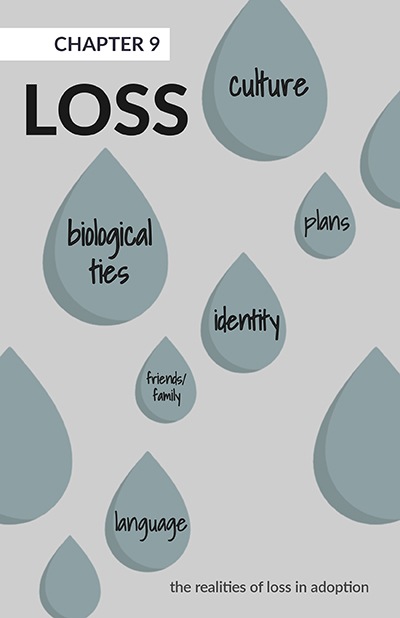
Life, as you pictured it . . .
When you were growing up, you most likely had an idea of how your life would turn out, or what it would look like. You may have pictured being married, having children and life just going as planned.
For both birth and adoptive parents, most of the time, adoption wasn’t in their life plans. So how do you come to terms with your dreams of what life would look like, being something else entirely? Before you look at adoption as an option for growing your family, you really need to reconcile the losses that infertility brings. Therapy for this is a must. Finding a support system with those that know what it is like it essential. A child will not cure your
infertility issues anymore than placing a child will not create great trauma. Both birth parents and adoptive parents must not ever put their issues on the adoptee and look to them to cure their grief.
We asked those connected to adoption about their losses and here is what a few of them said, “Im an AP and I can’t even begin to express the expansive losses I’ve experienced because of adoption. My kiddos came to me through private adoption and foster care. Even though we researched and prepared for everything that we thought could possibly come our way there was no way to prepare us for what the day to day life would be like with a severely mentally ill child (RAD, Schizophrenia). There are new losses every day. The loss of safety and security. Loss of sleep. Loss of sanity. The loss of the first eight years of their life.”
Family and friends may suggest that adoption is the easier option. Short answer, it is not. “We adopted our first two before getting pregnant with twins. My pregnancy was an absolute breeze compared to adoption. It really isn’t an event that happens once and it’s forgotten. It’s a lifelong journey and so hard, but rewarding in so many ways!”
“ The journey of adoption is emotionally traumatic. Often AP’s loss/pain is minimized because it pales in comparison to the birth parents. But pain is pain. There is no monopoly on grief. People who have not adopted do NOT know. So many people have said to me comments that infer that adoption is much easier than pregnancy. THAT.IS.NOT.TRUE!
The emotional rollercoaster is the most intense and vulnerable experience of my life. Adoption is not an event, it is a lifestyle. As an AP I feel the weight of my child’s pains and loss. It is so hard sometimes. I was diagnosed with secondary trauma as my foster/adopted child disclosed the horrors of her past. As I juggle the scheduling of biological connections for each of my 7 adopted children I feel physically and emotionally exhausted trying to honor each of these precious contacts for my child while trying to balance and cope with the fairness/unfairness of each situation as it compares to another of my children’s lives.
As I have adopted my children, I feel too that I have adopted everything and everyone that belongs to them, as my own. I have a responsibility and obligation to care for and worry about each and every one of them. Their struggles become mine and it is all consuming.
Having said all of that, I wouldn’t really change anything because this is my life. I love the children that I have and every piece that comes with them. We are all a little broken and damaged as we try to navigate this adoption journey. Each of my children’s story is unique and tragically beautiful.”
It is important to validate and acknowledge adoptive parent loss and grief (along with loss and grief of adoptees and birth parents and their families). To ignore pain will only make it worse, and many times, physically worse.
The only one who didn’t choose this loss (in most cases-some babies were taken from birth moms without their consent for sure) is the adoptees.
This is why it is essential to learn from everyone connected to adoption. To learn from each other and validate everyone’s roll and their grief/loss will only make you stronger.
“Grief is grief, and loss is loss. I believe it is vitally important that we can listen and respect what each of us have to share. Our realities count. Our sense of loss count. This will broaden our humanity and our capacity for compassion.”
“Adoption comes from loss on all sides. Adoption is deep and complex and we all hurt so deeply through it. I believe that when we are able to validate each others pain in this world by lifting them up during their hard times makes us all better humans. Your pain is not mine and mine is not yours but we all mourn what could have been.” – Birth mother
Acknowledging each other’s losses and empathizing with each other can go a long way. A birth mom said, “In the birthmom community of groups, I have been the unpopular one because I do realize the loss my birth daughter’s Mom experiences. I hate that APs feel like they have to hide their struggles because they “aren’t as great as the birth parents.” I, for one, do not think that is true. Different for sure, but not less. Please know there are us birth parents out there that acknowledge your pain and struggle!”
An adoptive mom had some great advice when she said, “It’s actually essential for APs who have dealt with infertility to process and work through their loss in order to have healthy triad relationships. Not doing so can manifest into issues like guilt, resentment, jealousy, a need to feel sole ownership of roles, unnecessary boundary setting, projecting, placing responsibility on adoptees to validate their importance, etc.
The loss that APs feel is actually something that has to be dealt with as early as possibly, then checked and fed regularly, to keep every other triad relationship healthy. I realize that on my other end of the triad relationship is another woman (and man in many cases) who are having to check and feed their needs regularly, too. The ultimate goal is for the adults to handle the most intense portions of this healing journey while the adoptees are still young so that we can learn and empathize and focus our energies on them when they’re older. So no shame at all – no lack of “popularity.” It’s like
putting your oxygen mask on first before helping anyone else with theirs.”
“We (adoptive parents) do have loss. I was surprised at how I felt leaving hospital with our daughter 3 weeks ago. I was more sad than happy mostly, because I felt bad for her birth family. Nothing had prepared me for how heartbroken I would feel for them. Thankfully we have a good open relationship and we even talked about all of our feelings since then. But still, adoptive parents have negative feelings too and that’s something that needs to be discussed.”
Culture, language, identity, biological ties, etc.

Adoptees have losses – none of them that they had a choice about. A lot of what was talked about in the Transracial Adoption chapter covers these losses. It is so important to validate each of these losses and not further the “grateful adoptee” narrative.
Adoptees can experience various types of losses, both tangible and intangible, that can impact their emotional and psychological well-being. These losses often stem from the circumstances surrounding their adoption and their subsequent life experiences. Some common losses include:
Loss of Biological Identity: Adoptees may experience a sense of loss related to their biological roots, including the loss of knowledge about their genetic background, family history, and cultural heritage.
Loss of Birth Parents: The separation from birth parents, whether due to adoption, parental death, or other circumstances, can result in a profound sense of loss. Even if the adoption is open and there is some level of contact, the loss of the initial parent-child relationship can be significant.
Loss of Birth Family: Adoptees may feel the absence of siblings, extended family members, and the broader birth family network. This can lead to a sense of disconnection from a larger family context.
Loss of Original Culture: For international or transracial adoptees, there may be a loss of their original cultural and ethnic identity, traditions, and language. This can create challenges in developing a sense of belonging and self.
Loss of Familiar Environment: If an adoptee was removed from their birth home or country, they may experience a loss of their familiar environment, routines, and the comfort of their previous life.
Loss of Self-Concept: The adoption process can sometimes lead to questions about one’s identity and worth. Adoptees might struggle with
feelings of rejection or inadequacy, which can affect their self-esteem and self-concept.
Loss of Connection: Adoptees may experience a sense of loss related to the disruption of their early attachment relationships, which can impact their ability to form and maintain secure relationships later in life.
Loss of Knowledge: The lack of information about their birth family and background can create a void, leading to feelings of uncertainty and a desire to fill in gaps about their personal history.
It’s important to recognize that these losses can affect individuals differently, and coping mechanisms vary from person to person. Many adoptees benefit from counseling, support groups, and open conversations with their adoptive families to address these feelings and experiences.
What about birth parents?

Birth parents who place their child for adoption often experience significant and multifaceted losses. These losses can impact their emotional and psychological well-being deeply throughout their lives. Here are some common types of losses birth parents might experience:
Loss of Parenting Role: Birth parents may grieve the loss of the opportunity to raise their child and be actively involved in their child’s daily life and
upbringing.
Loss of Connection: There is often a profound emotional loss associated with the separation from their child. This includes the loss of the
parent-child bond and the day-to-day interactions that come with parenting.
Loss of Future Experiences: Birth parents may mourn the loss of anticipated future experiences with their child, such as milestones, holidays, and personal growth moments.
Loss of Identity: For some birth parents, the decision to place a child for adoption can lead to a feeling of losing a part of their own identity, especially if they had envisioned themselves as parents or if the adoption process was emotionally taxing.
Loss of Hope or Dreams: The decision to place a child for adoption might involve sacrificing personal dreams or hopes for the future, both themselves and their child.
Loss of Connection to the Child’s Life: Even in open adoptions, birth parents may feel a loss of a direct and continuous role in their child’s life. The level of contact can vary, and there might still be a sense of detachment.
Loss of a Future Relationship: For birth parents in closed adoptions, there may be a deep sense of loss related to the lack of future relationship or updates about their child’s well-being and development.
These experiences of loss can lead to complex feelings, including grief, sadness, and guilt. It is critical that birth parents seek support through counseling, support groups, or connections with others who have had similar experiences to navigate these challenges.
Since this book is written for those looking to adopt, let’s end the chapter by going over a few more losses you may be working through.

These losses are often linked to the adoption process and the complexities involved in becoming and being a parent through adoption. Here are some common losses that adoptive parents might experience:
Loss of Biological Connection: Adoptive parents may feel a sense of loss related to not having a biological connection with their child. This can include not having a genetic link or not experiencing pregnancy and childbirth.
Loss of Traditional Parenting Experience: Some adoptive parents may mourn the loss of a traditional parenting experience, such as pregnancy, childbirth, and the early bonding that can come from those experiences.
Loss of Idealized Expectations: Adoptive parents may face a loss of their idealized vision of parenthood. They might have imagined a certain path or experience that differs from the reality of adoption, including the challenges and complexities that come with it.
Loss of Control Over the Adoption Process: The adoption process can be unpredictable and emotionally taxing. Adoptive parents might experience a loss of control over aspects such as timing, the background of the child, or the adoption process itself.
Loss of Privacy: The adoption process often involves sharing personal information and undergoing scrutiny, which can lead to a loss of privacy. Adoptive parents may feel exposed or judged during the process.
Loss of a Birth Family: Adoptive parents may experience a sense of loss related to the lack of connection with the child’s birth family. This can be especially poignant in cases where there is limited or no contact with the birth family.
Loss of Support or Understanding: Adoptive parents might face a lack of understanding or support from others who may not fully grasp the adoption experience or its challenges. This can lead to feelings of isolation or frustration.
Loss of Expectations for a Smooth Transition: The transition into adoptive parenting can be more complex than anticipated. Adoptive parents might experience a loss of the smooth, straightforward transition they had hoped for, especially if there are adjustment issues or challenges with the child.
Loss Related to the Child’s Background: Adoptive parents may grieve the loss of not knowing or being able to fully understand the child’s early life experiences, which can affect their approach to parenting and their relationship with the child.
Loss of Certainty: Adoptive parents may struggle with uncertainty regarding the child’s future, their development, and the ongoing relationship with the child’s birth family, which can be a source of stress and emotional strain.
These experiences of loss can real and require support, both for the parents themselves and for the family as a whole. Counseling, support groups, and open communication can be valuable resources for adoptive parents as they navigate these challenges and work to build a strong, loving family,
including the birth family.